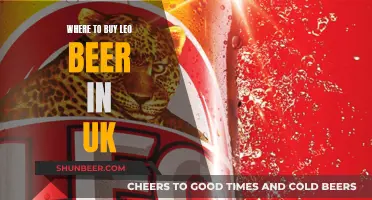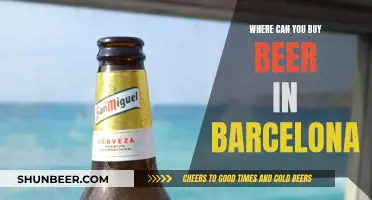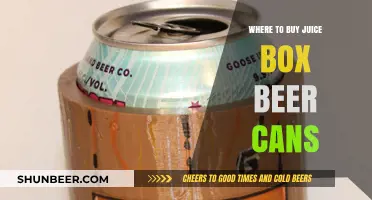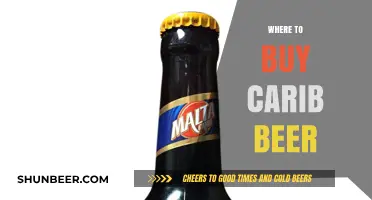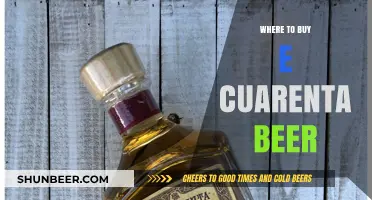
Minnesota has some of the strictest alcohol laws in the US. The state's liquor laws have been criticised for being outdated and overly prohibitive, with some arguing that they hurt small businesses. Beer, wine, and spirits cannot be purchased in grocery stores, and gas stations can only sell beer with an alcohol content of 3.2% or less, also known as near beer. This means that Minnesota is the last state that still sells 3.2% beer, and there is some debate over whether this law will change.
| Characteristics | Values |
|---|---|
| Can you buy beer at gas stations in Minnesota? | Yes, but only beer with less than 3.2% ABV, also known as "near beer" |
| Can you buy wine or spirits at gas stations in Minnesota? | No |
| Can you buy beer, wine, or spirits in grocery stores in Minnesota? | Only beer with less than 3.2% ABV |
| Can you buy alcohol in Minnesota on Sundays? | Yes, from 11 am to 6 pm, with a special license |
| Can you buy alcohol in Minnesota on Thanksgiving? | No |
| Can you buy alcohol in Minnesota on Christmas Eve? | Only before 8 pm |
| Can you buy alcohol in Minnesota on Christmas Day? | No |
What You'll Learn
- Minnesota's liquor laws are hurting small businesses
- Beer with less than 3.2% ABV can be sold at gas stations
- Grocery stores can sell beer with up to 3.2% ABV
- Liquor stores in Minnesota can sell wine and spirits from 8 am to 10 pm, Monday to Saturday
- Minnesota's liquor laws are restrictive compared to other states

Minnesota's liquor laws are hurting small businesses
Minnesota's liquor laws are causing small businesses to suffer. The state's strict alcohol rules, which date back to the prohibition era, are a source of frustration for many business owners.
In Minnesota, only beer with less than 3.2% alcohol content can be sold at grocery stores and gas stations. This is in stark contrast to most other states, where customers can purchase a wider range of alcoholic beverages, including full-strength beer and wine, at convenience stores. This restriction is particularly detrimental to small businesses, as it limits their ability to meet customer demands and stay competitive in the market.
The owner of 36 Lyn Refuel Station, an independently owned convenience store and refueling station in South Minneapolis, expressed their frustration with the current liquor laws. They highlighted how these outdated regulations prevent them from selling the regular beer and wine that their customers want. The market for 3.2% beer is rapidly declining, with fewer brewers producing it and consumers opting for other options. As a result, small businesses like 36 Lyn Refuel Station are missing out on potential revenue and struggling to keep up with the competition.
The situation is further exacerbated by the existence of "mom and pop" liquor stores, which are often small, family-owned businesses with a strong local presence. These stores have traditionally been the only option for purchasing wine and distilled spirits in Minnesota, as they are not available in grocery stores or gas stations. However, this monopoly is now being challenged by larger grocery chains that have obtained liquor store licenses and set up separate liquor stores within their premises. While this provides customers with more options, it also intensifies the competition for small businesses, making it harder for them to survive.
Some lawmakers, such as State Senator Karin Housley, have recognized the need for change. Sen. Housley intends to introduce a bill to allow the sale of strong beer and wine in grocery stores and gas stations, bringing Minnesota in line with 39 other states that have already made this change. However, this proposal faces strong opposition from liquor store owners, who fear that altering the status quo will threaten their businesses. They argue that allowing grocery stores and gas stations to sell a wider range of alcoholic beverages will result in increased competition and potentially drive smaller liquor stores out of business.
Despite the opposition, there is a growing consensus that Minnesota's liquor laws need to be modernized. The current restrictions are not only detrimental to small businesses but also inconvenient for consumers, who often have to make separate trips to different stores to purchase their desired alcoholic beverages. By updating its liquor laws, Minnesota can create a more level playing field for businesses and provide greater convenience for its residents.
Helium Beer: Where to Buy This Unique Beverage?
You may want to see also

Beer with less than 3.2% ABV can be sold at gas stations
Minnesota has some of the most restrictive liquor laws in the United States. Beer with less than 3.2% ABV can be sold at gas stations and grocery stores in Minnesota. However, this is the only type of beer that can be sold at these locations.
The 3.2% ABV limit on beer sold at gas stations and grocery stores is a unique feature of Minnesota's liquor laws. In fact, Minnesota is the last state that has laws mandating the need for 3.2% ABV beer. This limit is a remnant of Prohibition-era laws and is seen by many as outdated.
There have been efforts to change these laws and allow the sale of wine and stronger beer in grocery and convenience stores. However, these efforts have been met with opposition from liquor store owners, who argue that changing the law would hurt small businesses and that grocery stores can survive without selling alcohol.
Additionally, the market for 3.2% ABV beer is rapidly declining, with fewer brewers producing it and consumers opting for other options. The sale of liquor on Sundays in Minnesota, which was legalised in 2017, also reduced the demand for 3.2% ABV beer.
While the sale of beer with less than 3.2% ABV is permitted at gas stations and grocery stores in Minnesota, the sale of wine and distilled spirits is restricted to municipal liquor stores. These stores are typically open from 8 AM to 10 PM, Monday to Saturday, and 11 AM to 6 PM on Sundays.
The Best Places to Buy Beer in Maine
You may want to see also

Grocery stores can sell beer with up to 3.2% ABV
Minnesota has some of the most restrictive laws on alcohol sales in grocery stores in the United States. Grocery stores in Minnesota can only sell beer with an alcohol content of up to 3.2% ABV. This is known as "3-2" or "near beer".
This law is a source of frustration for some business owners, who feel that it is outdated and hurts small businesses. They argue that Minnesota is the only state still selling 3.2% beer, and that manufacturers are no longer producing it, making it difficult for grocery stores and gas stations to source this product.
Some lawmakers have attempted to introduce legislation to change this law, but it has been opposed by liquor store owners, who fear that allowing grocery stores to sell wine and strong beer would hurt their businesses.
The debate around this issue is complex, with strong opinions on both sides. While some argue that the law should be changed to modernise Minnesota's liquor laws and provide convenience and choice for consumers, others argue that changing the law would hurt small businesses and disrupt the balance of the alcohol distribution industry in the state.
Colorado Sunday Beer Buying: What's the Deal?
You may want to see also

Liquor stores in Minnesota can sell wine and spirits from 8 am to 10 pm, Monday to Saturday
Minnesota has some of the most restrictive liquor laws in the US. The state has been criticised for its outdated alcohol laws, which are said to be hurting small businesses. In Minnesota, liquor stores can sell wine and spirits from 8 am to 10 pm, Monday to Saturday, and 11 am to 6 pm on Sundays. On-premise alcohol is sold seven days a week from 8 am to 2 am.
The state's liquor laws have been described as "prohibition-era", with Minnesota being one of the few remaining states in the US where full-strength beer and wine cannot be purchased in convenience stores and gas stations. Gas stations and grocery stores are only permitted to sell beer with an alcohol content of 3.2% ABV or less, often referred to as "3.2 beer", "near beer", or "4% ABV".
This has led to a decline in the market for 3.2% ABV beer, with fewer brewers producing it and fewer consumers purchasing it. In recent years, Minnesota has made some changes to its liquor laws, including allowing liquor stores to open on Sundays and permitting breweries to sell more growlers and crowlers. However, grocery and convenience stores are still prohibited from selling wine and strong beer, and there is ongoing debate about whether these laws should be updated.
Some argue that modernising liquor laws would help small businesses stay competitive and give craft breweries and local wineries more opportunities to sell their products. On the other hand, owners of small liquor stores fear that changing the law would negatively impact their businesses, as customers might opt to buy alcohol from grocery or convenience stores instead.
While the sale of wine and strong beer in grocery stores remains illegal in Minnesota, some grocery stores have found a loophole by obtaining liquor store licenses and operating separate, attached liquor stores with their own entrances.
Dollar General Beer Buying Guide: What's Available?
You may want to see also

Minnesota's liquor laws are restrictive compared to other states
In addition, Minnesota has 226 cities with city-owned liquor stores, and most of these cities have an off-sale monopoly on these products within their boundaries. This means that private off-sale liquor stores cannot operate within these cities, further limiting competition. Minnesota has fewer off-sale liquor outlets per adult than 40 other states and the District of Columbia, with the number of off-sale outlets per adult being only about one-third of the national average.
The state's laws also impact pricing. Off-sale beer prices are 7 to 9 percent higher in Minnesota compared to Wisconsin, a state with fewer restrictions on retail competition. Wine prices are also higher in Minnesota, while prices for distilled spirits are lower due to a state law that encourages competition among spirits wholesalers.
Minnesota's liquor laws have been a source of contention for small business owners, who argue that the restrictions hurt their businesses and limit consumer choice. Some have called for modernizing the state's liquor laws, particularly those related to the sale of beer and wine in convenience stores and grocery stores.
Overall, Minnesota's liquor laws are more restrictive than those in many other states, impacting the availability and pricing of alcoholic beverages for consumers.
Buy Beer Wholesale: A Guide to Bulk Beer Buying
You may want to see also
Frequently asked questions
Yes, but only beer with less than 3.2% ABV, also known as "near beer".
"Near beer" has less than 3.2% ABV, which is approximately 4% alcohol by volume.
No, only "near beer" is available at gas stations. Wine and spirits are sold at municipal liquor stores.
Yes, but only "near beer" with less than 3.2% ABV.


